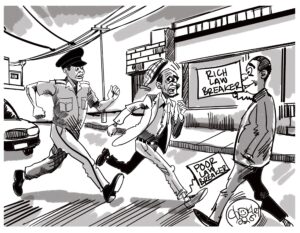I love salaula shopping. Not only is it one of my favourite things to do in Lusaka, but also I have taken people―including the reviewer from Lonely Planet travel guides―on tours of the Lumumba road area specifically to share what I call the “Salaula Experience”.
I firmly believe that the thousands of traders plying their wares on the avenues and side streets of downtown represent not just a crucial economic activity but also a unique tourist attraction unlike anything else in Zambia.
So when I hear council officials or politicians crying about marketeers and threatening to remove them from the streets, sometimes violently, my instinct is to stand with the traders. And not just because I want a discount on my next shopping spree.
Street traders have been a reality since Frederick Chiluba overturned UNIP’s stranglehold on the economy and allowed Zambians to trade more or less wherever they wanted. While this created jobs and increased the supply of trade goods, it also meant that over time a free-for-all mentality developed; the ultimate expression of the “free market”, manifested by the countless marketeers that ply their wares throughout Zambia.
The fact is, informal sector workers outnumber formal employees by a factor of at least two to one, maybe even three to one. There are likely more than two million traders and other informal workers in Zambia, while fewer than a million formal, tax-paying jobs exist.
One of the most common arguments against street traders is that they don’t pay tax, however this is far from the truth. On average, most traders pay at least 10 kwacha every single day to council officials, cadres, or local thugs, but of course none of this “tax” money reaches the government purse.
Neither do informal workers receive benefits such as NAPSA pension schemes or labour union protection. Instead, traders are treated as cash machines by unscrupulous authorities, and as convenient scapegoats by politicians intent on blaming all of society’s ills on those who are incapable of defending themselves. It’s no wonder that marketeers resort to violence and rioting when officials threaten them with eviction.
Let’s face it: There is currently no equitable solution to the issue of informal marketeers, let alone any accurate data on the phenomenon. Street trading is not viewed as a social and economic fact worthy of study and understanding, therefore the official response is blustering and blundering at best, or violent repression at worst.
No lasting solution can be found without first understanding the realities of street trading, recognizing how important marketeers have become to our economy, and sympathizing with marketeers as people who are vulnerable to abuse and exploitation.
The first thing we must do is stop scapegoating street vendors and other informal workers. Not only is it unfair and inaccurate to blame marketeers for the ills of society―public urination, uncollected garbage, crime, corruption, congestion, etc―but it is also an old and dishonest tactic used by the political class to distract the public from their own failings. (Not to mention the fact that scapegoating and victimizing vulnerable people is also deeply un-Christian!)
Second, councils need to hold indabas that include traders and marginalized workers, and recognize them as full participants and stakeholders in the economic life of our communities. It is impossible to continue ignoring these people as if somehow they are less valuable citizens who will just go away if we oppress them.
Third, more information must be known about the reality of street trading. Google has been used in Africa to map minibus routes, so why can’t we map street vending in order to better understand the extent of the phenomenon and suggest possible solutions?
Fourth, we need to rethink approaches to road traffic in cities like Lusaka that are growing out of control. Major streets such as Lumumba need to be reevaluated as far as vehicular, pedestrian, and trader use, while side streets could be blocked off from vehicles entirely, allowing some streets to be pedestrian only. This may seem radical in a city that is literally falling apart, but some crises need radical solutions.
Fifth, government should rethink tax policy to include those with special circumstances like informal workers. The PAYE structure may work for formal employment, but informal workers should be taxed as well, not as they are now―by crooks who pocket the money―but by the ZRA who can and should be responsible for collecting such taxes from all working citizens.
And finally, we must allow and encourage informal workers to organize themselves within a formal trade union, not that informal and politically partisan “associations” that exist now. Informal sector workers are arguably the hardest working people in Zambia. These workers toil from dawn till dark, 6 or 7 days a week, in conditions that put to shame the formal, office-going class of “superior” workers.
Not only do they work in conditions of extreme hardship and disrespect, informal workers are also denied access to the benefits enjoyed by organized labour union members, such as protections, loan assistance, and the right to strike.
Despite making up at least two-thirds of the Zambian labour force, informal workers are not allowed to march in the labour day march past, as only those unionized workers allied to the Zambia Congress of Trade Unions are allowed to do so.
Excluding the majority of Zambian workers from labour protections and rights is simply unjust and unsustainable. Formal sector unions have existed in this country since long before Independence, meanwhile informal workers have never been organized due to their vulnerability.
Yet there exist labour unions such as the International Workers of the World which specifically organize vulnerable workers. Also known as the One Big Union, the IWW is the only union in the United States to organize prison workers (Incarcerated Workers Organizing Committee) while in Canada they organized street beggars into the world’s first “Panhandlers Union”.
In these tough economic times, we need to show solidarity and support for those in our society who are struggling to make a living, rather than disabusing them of their rights as workers and fellow human beings. It’s just the right thing to do.


















